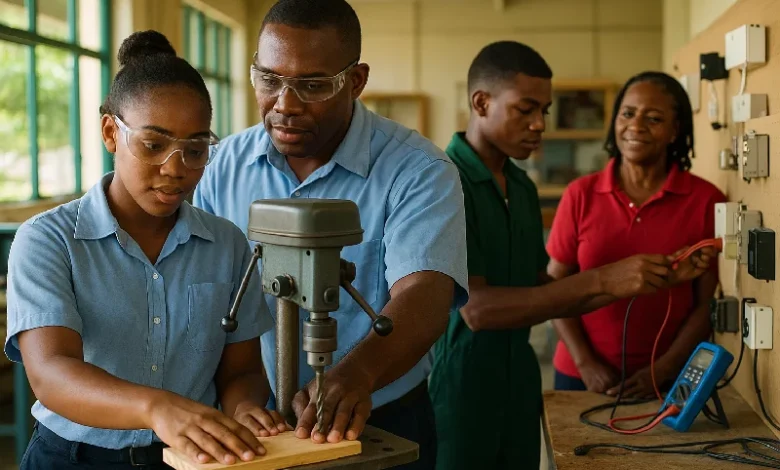Vocational Training in Dominica

Vocational training in Dominica, formally recognised as Technical and Vocational Education and Training (TVET), plays a pivotal role in equipping citizens with the hands-on skills needed to participate meaningfully in the island’s growing economy. Managed primarily through the Ministry of Education, TVET provides pathways for young people and adults to secure employment in practical trades, grow local enterprises, and support national resilience and productivity. The system promotes lifelong learning, skills recognition, and linkages between training and the labour market, especially in priority sectors like agriculture, construction, tourism, renewable energy, and digital services.
Overview of National TVET Structure
Dominica’s TVET system is guided by the Dominica TVET Council, which ensures that training providers adhere to regional and national standards. These standards include competency-based approaches aligned with the Caribbean Vocational Qualification (CVQ) and the National Vocational Qualification (NVQ) framework. The Council works closely with school administrators and stakeholders in the private sector to keep the curriculum responsive to labour market trends.
The TVET Council also plays a regulatory and quality assurance role, ensuring proper assessments, verifying workplace competencies, and promoting instructor development. This coordination makes Dominica part of a wider CARICOM effort to enhance workforce mobility and economic competitiveness through certified, portable vocational skills.
Curriculum and Training Areas
TVET programmes are embedded in the national secondary education system. As of 2024, seven public secondary schools incorporate TVET in their curricula, offering at least twelve areas of technical training. These include: Auto mechanics, Woodwork and Joinery, Electrical Installation, Air-Conditioning and Refrigeration, Agriculture, Food preparation, Home Management, Clothing and Textile, Garment Construction, Family Resource Management, Information Technology, Technical Drawing.
At the post-secondary level, the Dominica State College offers advanced TVET modules in construction supervision, business processing, ICT, hospitality, and environmental science. Students have access to both theory and practicum, with CVQ Level 1 to Level 3 qualifications offered through industry collaboration. In April 2025, Dominica celebrated its first batch of CVQ Level 3 certifications in Construction Site Supervision, a milestone that highlights its expanding focus on supervisory and management training.
Youth Training and Community Access
The Youth Development Division is a major player in Dominica’s vocational training ecosystem. Through the Youth Skills Training Programme (YSTP) and other interventions, it delivers accessible, short-term, community-based training across rural and urban centres. These programmes have reached thousands of young Dominicans since their inception, offering entry-level instruction in areas such as:
- Computer literacy and small electronics repair
- Graphic design and digital media
- Cosmetology and wellness services
- Plumbing, masonry, and carpentry
- Sewing and small business management
In 2024–2025, the Division rolled out expanded programming to include solar PV installation, web development, and hospitality soft skills, supporting the goals of both the Youth Economy Programme and the Digital Economy Development Plan. These programmes are typically six to twelve months in duration, and some include startup support or apprenticeship placement, especially in sectors aligned with Dominica’s climate resilience strategy.
Certification and Labour Mobility
The integration of NVQ and CVQ qualifications means that Dominica’s vocational learners are gaining certifications that are recognised across the Caribbean Single Market and Economy (CSME). This has allowed Dominican nationals to take up jobs regionally, particularly in construction, hospitality, and marine services. The Caribbean Association of National Training Agencies (CANTA) oversees external assessment, ensuring that local certifiers maintain regional standards.
Candidates receive NVQ/CVQ certifications after both classroom instruction and workplace assessment. Between August 2024 and April 2025, 110 Dominicans earned NVQ certifications, and an additional 15 achieved CVQ Level 3 status, a significant boost to the country’s skilled labour pool.
Institutional Collaboration and Future Plans
Several bilateral and regional partnerships support Dominica’s vocational training programmes. The CARICOM Education for Employment (C-EFE) project, implemented with the assistance of the Nova Scotia Community College, is helping Dominica establish modern technical learning environments. Through this programme, Dominica State College and selected high schools are receiving curriculum development, instructor training, and lab upgrades.
The island is also moving toward the creation of a TVET Centre of Excellence at the new Goodwill Secondary School, slated for completion in 2026. This centre will serve as a national hub for technical instruction, offering advanced certification in trades like renewable energy, food technology, robotics, and construction management. The project reflects Dominica’s vision of becoming a knowledge-based, resilient economy by 2030.
Challenges and Outlook
Despite significant strides, challenges remain. These include limited access to modern training equipment in rural communities, occasional mismatches between training offerings and labour market demand, and the need for better public-private partnerships. However, continued government investment, regional collaboration, and digital innovation are strengthening the system.
Vocational training in Dominica continues to serve as a cornerstone of economic inclusion. With national frameworks improving, certification becoming more standardised, and new industries emerging, the country is well-positioned to turn technical skills into long-term livelihoods and national growth.




